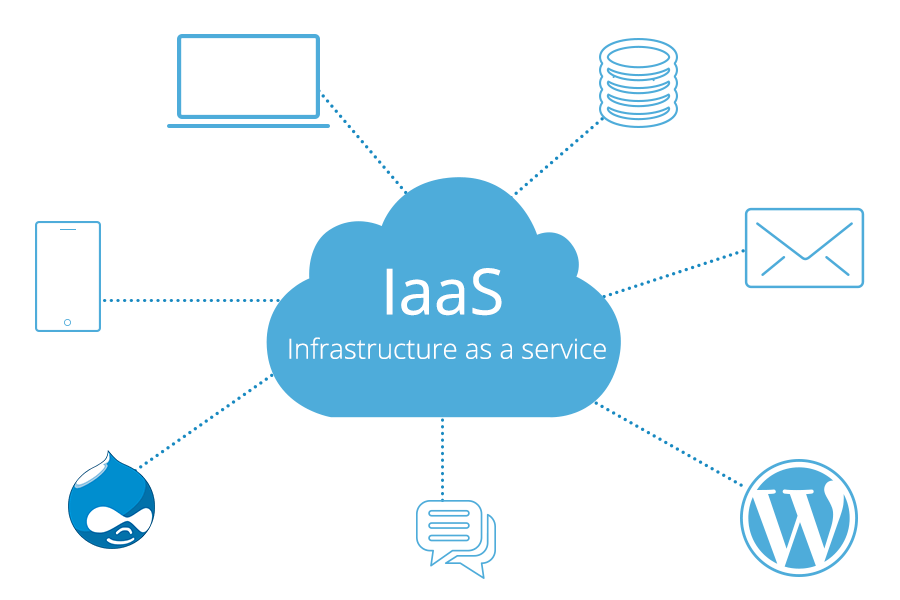Understanding the Advantages Challenges of Infrastructure as a Service IaaS

Understanding the Advantages Challenges of Infrastructure as a Service IaaS
What is Infrastructure as a Service IaaS?
IaaS is a cloud computing model that offers virtualized computing resources over the internet. It provides scalable and ondemand access to essential infrastructure components like servers storage networking more. Users can rent these resources from a cloud service provider instead of investing in and maintaining their physical hardware.
Benefits of IaaS
Scalability Flexibility
IaaS allows businesses to scale resources up or down based on demand enabling flexibility in operations
CostEfficiency
Pay-asyou-go pricing models help reduce upfront infrastructure costs allow for better cost management.
Global Accessibility
Users can access infrastructure resources from anywhere globally with an internet connection.
Resource Management
Outsourcing infrastructure management allows businesses to focus on core competencies while leaving maintenance and updates to the provider.
Disaster Recovery and Security
IaaS providers often offer robust security measures and disaster recovery options, enhancing overall data protection.
Challenges of IaaS
Security Concerns
While providers implement security measures concerns about data breaches and vulnerabilities in shared environments persist.
Compliance and Governance
Adhering to industry regulations and ensuring data governance can be challenging when utilizing third-party infrastructure.
Dependency on Providers
Businesses reliant on IaaS providers may face risks if the provider experiences downtime or operational issues.
Integration Complexity
Integrating IaaS with existing systems and applications can be complex and requires expertise.
Use Cases and Industry Examples
Various industries benefit from IaaS such as startups needing scalable infrastructure enterprises optimizing costs healthcare requiring secure data storage.
Conclusion
In conclusion Infrastructure as Service offers numerous advantages in terms of scalability costefficiency and global accessibility. However challenges related to security complianceintegration need to be carefully addressed. Understanding these aspects is crucial for businesses aiming to leverage IaaS effectively while mitigating associated risks.
References
Insert references or citations as applicable.
provides a comprehensive overview of Infrastructure as a Service (IaaS), highlighting its benefits, challenges, industry applications, and considerations for businesses planning to adopt this cloud computing model.
Infrastructure as a Service IaaS offers numerous benefits to businessesorganizations revolutionizing the way they manage their IT infrastructure Here are the key advantages of utilizing IaaS
Scalability
One of the primary benefits of IaaS its scalability It allows businesses scale resources up or down based on demand. Whether a company experiences sudden spikes or dips in resource usage, IaaS provides the flexibility to adjust computing capacity quickly, ensuring efficient operations without the need for investing in additional physical hardware.
Cost-Efficiency
IaaS operates on a payasyougo or subscriptionbased pricing model. This means organizations only pay for the resources they use, reducing upfront infrastructure costs. Businesses can avoid the expenses associated with maintaining and upgrading hardware as these responsibilities are shifted to the IaaS provider. Additionally the scalability aspect ensures optimal resource utilization, further maximizing cost savings.
Global Accessibility
IaaS solutions are accessible from anywhere with an internet connection. This global accessibility enables remote work, facilitates collaboration among geographically dispersed teams, and supports businesses with multiple offices or a global presence. Users can access infrastructure resources regardless of their physical location, enhancing flexibility and productivity.
Resource Management
By outsourcing infrastructure management to the IaaS provider, businesses can focus more on their core competencies. Maintenance updates security patches hardware upgrades become the responsibility of the provider freeing up the organization's IT staff to work on strategic initiatives and innovation.
Disaster Recovery and Security
Reputable IaaS providers offer robust security measures and disaster recovery options. These include data encryption, regular backups, redundancy across multiple locations, and compliance with industry standards and regulations. Such features help enhance data security and ensure business continuity in case of unforeseen events.
Innovation and Agility
IaaS allows for rapid deployment of new applicationsservices It fosters innovation by providing developers IT teams with the necessary tools resources to experiment create deploy solutions more quickly. This agility enables businesses to respond faster to market changes customer needs.
Environmentally Friendly
IaaS can contribute to environmental sustainability by reducing the need for physical infrastructure leading to lower energy consumption and carbon footprints.
Understanding these benefits helps organizations make informed decisions when considering the adoption of IaaS, enabling them to leverage these advantages to drive efficiency, innovation, and growth in their operations.